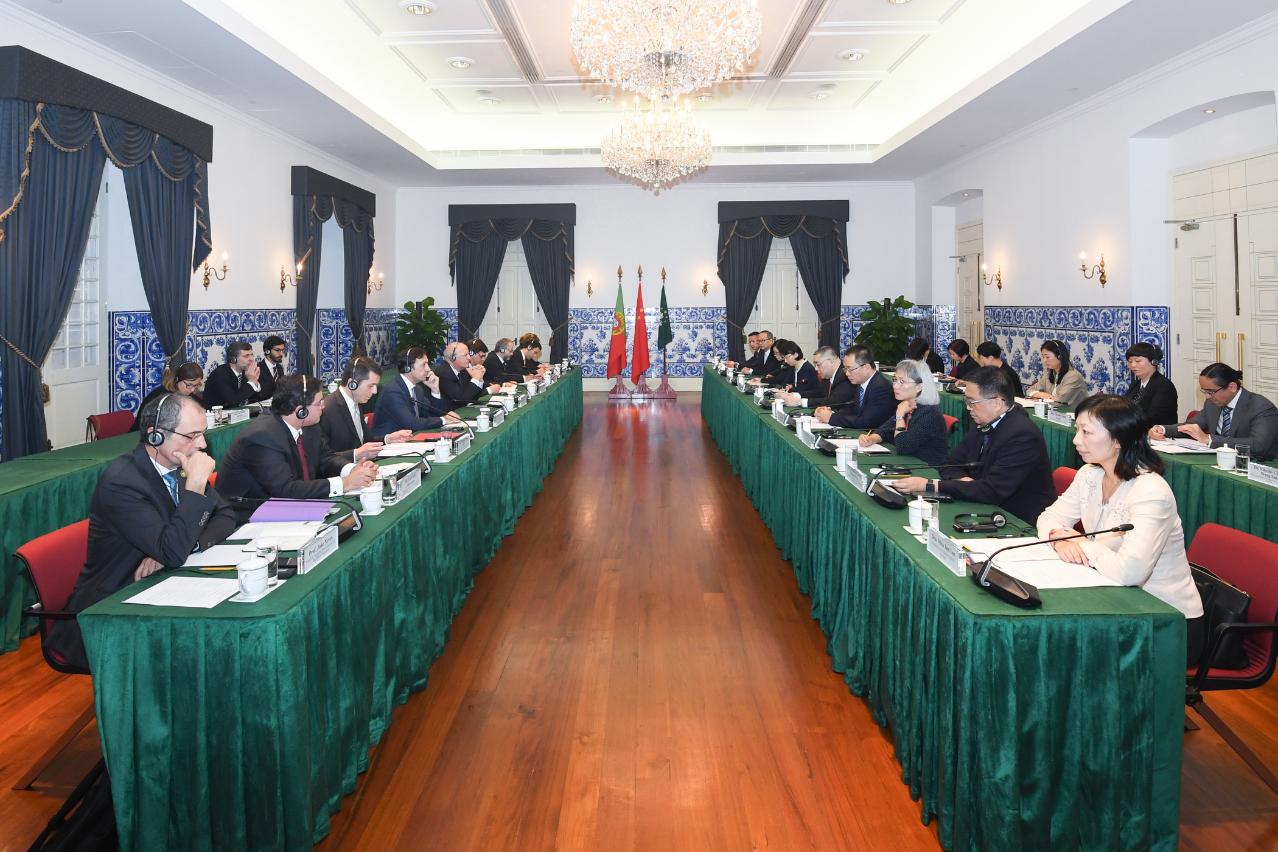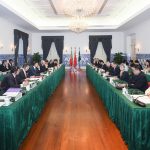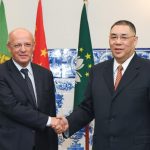 The Chief Executive, Mr Chui Sai On, and the Minister of Foreign Affairs of the Portuguese Republic, Mr Augusto Santos Silva, co-chair the fifth meeting of the Macao-Portugal Joint Committee, which is held in Macao.
The Chief Executive, Mr Chui Sai On, and the Minister of Foreign Affairs of the Portuguese Republic, Mr Augusto Santos Silva, co-chair the fifth meeting of the Macao-Portugal Joint Committee, which is held in Macao.
The Government pays great attention to advancing closer Macao-Portugal ties, helping the city to play its strategic role in linking China and Portugal.
The Chief Executive, Mr Chui Sai On, made the remarks today during the fifth meeting of the Macao-Portugal Joint Committee, which was held this morning at Government Headquarters in Macao.
Co-chairing the meeting was the Minister of Foreign Affairs of the Portuguese Republic, Mr Augusto Santos Silva, as part of his three-day visit to Macao.
Today’s Macao-Portugal Joint Committee meeting reviewed ongoing achievements and explored fresh opportunities for further cooperation. The Chief Executive also briefed the Portuguese officials on the latest developments in Macao’s advancement, in particular how the Government was integrating the city into the overall development of the country.
Mr Chui and Mr Santos Silva jointly met reporters to share more information regarding future Macao-Portugal cooperation. They covered a number of topics, spanning economic and trade issues, culture, language training, and education.
On economic and trade matters, it was stated that Macao would assist Portuguese businesses interested in taking part in the development of the Guangdong-Hong Kong-Macao Greater Bay Area and the “Belt and Road” initiative.
It was noted that Macao had been designated a “China-Portuguese-speaking Countries Young Entrepreneur and Innovation Exchange Centre”. As such, a number of young Portuguese entrepreneurs leading innovative projects would be invited to visit Macao next year, in order to share their insights with local people.
In addition, the Government would encourage more young business people from Macao to explore opportunities in Portugal regarding innovation and entrepreneurship.
Regarding promotion of the Portuguese language, Macao had the capabilities and experience to become the best training base in Asia for teaching of Portuguese language skills. Macao would also establish more courses and academic entities focusing on the Portuguese language.
It was further stated during Mr Chui’s and Mr Santos Silva’s briefing that Macao’s Talents Development Committee and the Council of Rectors of Portuguese Universities planned to sign an agreement next year, to provide scholarships to Macao students seeking to study at universities in Portugal.
Mr Chui noted that the year 2019 would mark, respectively, the 70th anniversary of the founding of the People’s Republic of China; the 40th anniversary of diplomatic relations between the People’s Republic of China and Portugal; and the 20th anniversary of Macao’s return to the motherland.
Macao was as always dedicated to furthering ties between China and Portugal, and to making further contributions to the comprehensive strategic partnership of cooperation between the two countries, he added.
In the press briefing, Mr Santos Silva said the two sides had discussed a number of topics during the Joint Committee meeting, including consumer protection and mutual recognition of academic degrees in higher education.
Friendly relations between Macao and Portugal served as an important gateway for the Portuguese business sector to enhance investment on the mainland, he said.
Closer Macao-Portugal ties not only benefited Chinese and Portuguese people, but also benefited – via Portugal as a link – people in other Portuguese-speaking countries such as Brazil, Angola, Cabo Verde, Guinea-Bissau, Mozambique, and Timor-Leste.
Mr Santos Silva stated China and Portugal both strove for economic development and sustainability. Strengthening mutual trust between the two countries would encourage further exchanges in all aspects between their people, businesses and governments.
The Minister said he looked forward to President Xi Jinping’s visit to Portugal in December.
In his concluding remarks the Chief Executive said today’s Joint Committee meeting had been fruitful, adding he expected the next meeting to make further advances on the topics discussed today.
Prior to the Macao-Portugal Joint Committee meeting, Mr Chui additionally held a separate meeting with Mr Santos Silva to exchange views on how to strengthen reciprocal relations between Macao and Portugal.
The Macao-Portugal Joint Committee was established under the Framework Agreement of Cooperation between the Macao Special Administrative Region of the People’s Republic of China and the Portuguese Republic, with the aim of strengthening cooperation between the two sides in a number of areas.
The fourth meeting of the Macao-Portugal Joint Committee was held in Portugal in September 2016.
Macao officials attending today’s Macao-Portugal Joint Committee meeting included: the Chief-of-Office of the Chief Executive’s Office, Ms O Lam; the Director of the Government Information Bureau, Mr Chan Chi Ping; the Director of the Protocol, Public Relations and External Affairs, Ms Lei Ut Mui; and the Director of the Macao Economic and Trade Office in Lisbon, Ms O Tin Lin.
Representing the Portuguese Republic at the Macao-Portugal Joint Committee meeting were: the Portuguese Ambassador to China, Mr José Augusto Duarte; the Secretary of State of Internationalisation, Mr Eurico Brilhante Dias; theConsul-General of Portugal in Macao and Hong Kong, Mr Paulo Cunha Alves; the General Director for Foreign Policy of the Ministry of Foreign Affairs, Mr Pedro Costa Pereira; and the President of the Agency for Investment and Foreign Trade of Portugal, Mr Luís Castro Henriques.



